#this is proof it’s not a choice
Text
My worst enemy is finding girls attractive when they give straight energy
#it feels so awkward#even though no one would know#this is definitely internalized homophobia#at least I don’t feel guilty for finding fruity girls attractive anymore#or do I#being homo is hard#homo life#lesbian#sapphic#queer culture is feeling guilty whenever you find people attractive#this is proof it’s not a choice#why is every girl pretty it’s annoying sometimes#I mean at least I forget mini crushes exist right after they’re out of sight#so it really doesn’t matter#I still feel bad cuz internalized homophobia lol
2 notes
·
View notes
Text
“im a hater at heart” and its biphobia
#was forced to see bg3 shit takes and now i am capital p Pissed#also misogyny ‘straight girls romancing astarion/modding/etc’ like#did they kill ur grandma?? or are you using ‘straight’ to justify being misogynistic to women because you dont make the same choices#and ‘this character is def gay!! no way theyr bi’ and their ‘proof’ is homophobic stereotypes#be normal
328 notes
·
View notes
Text
This is technically in response/as an addition to a post on the supposed ‘double standard’ in the fandom between Zuko and Jet as Katara’s love interests, but it’s been so long since it was posted and I figured the OP would be entirely uninterested in my word vomit, especially after like one and half years—so, separate post. I added a link for those interested. There's a cut because this got quite long lmao.
In short, the post supposes the argument that though Jet would’ve made Katara kill people (something Zuko very much Did Not Do, no matter what you think about The Southern Raiders), he cleaned up his act after this. Zuko, on the other hand, did lots of Really Bad Things to Katara & Co. with far more frequency than Jet did and got redeemed after a multitude of episodes doing Various Things Moste Evile. To then slap Jet with The Toxic Ex-label and see Zuko as the ‘healthier’ and ‘better’ option creates a Double Standard(™) within the fandom, which is supposedly bad and not an arguably incorrect reading.
But the differences in fandom perception between Jet and Zuko as Love Interests for Katara (one of which canonically, and the other potentially and apparently talked about in the writer’s room) are easily explained, as can the Supposed Double Standard—just by thinking about it from Katara’s viewpoint, or even the audience’s. Because, well, the worst things Jet ‘almost’ ended up doing didn’t happen because of outside interference only.
That’s the important bit here. He 100% would’ve drowned an entire village just to get rid of a handful of Fire Nation soldiers, had Sokka not managed to evacuate everybody. He 100% would’ve grievously injured two people who, as far as Jet and everybody else were aware, were refugees who might not even be firebenders — considering nobody else saw Iroh heat up his tea, he could’ve been wrong — in an attempt to prove his own hunch. Had the guards not been there, had Zuko not been able to fight back with swords, Jet would’ve genuinely attempted to wound them for as much as a puff of smoke. And Jet consistently involves bystanders (innocent or not) in his desperate quest to harm and defeat the Fire Nation: the Gaang (and particularly Katara, through explicitly manipulative means) and the villagers in Jet; Zuko, Iroh, and the people in the teashop in City of Walls and Secrets. Additionally, we don’t see more violence from him because he’s not a main character like Zuko is—though it’s implied that Jet beats up villagers who are supposedly in cahoots with the Fire Nation often, only agreeing to turn over a new leaf when he, Smellerbee, and Longshot decide to move to Ba Sing Se.
Zuko explicitly and frequently doesn’t harm people: that, or it isn’t important to the plot. He doesn’t burn down the village on Kyoshi, he literally only manages to lightly singe it. He threatens people with violence frequently but never actually goes in for the kill. I’d argue that the most explicitly violent thing he does in Book 1 is breaking Aang out of the Pouhai Stronghold—for his own ends obviously, but if it’s spelled like treason and sounds like treason, it’s probably treason. When he thinks of robbing the pregnant couple while he’s on the run, he stops himself of his own volition; when he considers using Appa to catch Aang (this was a point made against Zuko in the post), he’s unaware of what Appa’s been through prior to that point and sees him as no more than an animal used for travel, much like the ostrich horse he stole earlier in the season.
Zuko’s schtick throughout Book 1 and 2 is that he doesn’t want to think of the consequences of his actions. His plans are never fully complete. He doesn’t think of how he’s going to get a chained, notoriously slippery little eel of an Avatar to the Fire Nation, and he doesn’t think about what would happen to twelve-year-old Aang after they got there—which is horrible of him, but it also shows an odd, ignorant kind of innocence that you’d associate with a kid who’s got a hard time telling right from wrong. Like, I love Zuko dearly, adore him even, but kiddo doesn’t think ahead until the Book 2 finale and even that’s debatable. He’ll eventually start thinking ahead a little bit but for the most part, he doesn’t. Not saying that takes away responsibility, because it absolutely doesn’t, but it is telling of Zuko’s character: he’s an ‘act first, think later’-kind of guy, all ‘fuck around; find out; maybe success’. His sole goal throughout Book 1 and 2 is going home, without even thinking on how to get there beyond like, Avatar in my custody => back in Fire Nation with Avatar => dad loves me again. And he says that his only intention is to go home too, in Ep 2 of Book 1:
Aang: If I go with you, [He holds his staff in front of him as an offer, making sure Zuko understands that he does not wish to continue fighting.] will you promise to leave everyone alone?
[The camera cuts to a side-view of the area, Zuko's men still surrounding him, spears poised. After a brief moment of hesitation, Zuko erects himself and nods in agreement. Aang is apprehended by Zuko's men, who take his staff . . . ]
Zuko: [Boarding the ship up the walkway. Determined.] Head a course for the Fire Nation. I'm going home.
(Added emphasis for my point)
Zuko is not the Big Bad. He’s not The Largest Threat. He never is. In Book 1 it’s Zhao, in Book 2 it’s Azula, and in Book 3 it’s Ozai. Zuko is a consistent threat, yes, but not a particularly large one no matter how good of a fighter he is. Because he’s presented to us as a disastrously hurt and traumatised little brat who we, the audience, are supposed to feel sorry for, and slowly grow fond of. Because we learn in The Storm that the notion of “caring for others is weak” has literally been branded into him. Because he keeps getting back up to fight, but consistently holds back. We are shown that he knows, on some level, that what he’s doing is wrong: the text suggests that Zuko is actively suppressing his morals. And by the time Zuko hires an assassin to ensure the Avatar is dead, we know that Zuko is incredibly unhappy with his choice(s) and is desperate to be safe; that he’s uncomfortable but wants to be comfortable; that he’s incorrect about the source of his fear while he’s back in the palace. The audience is shown this explicitly.
By contrast, we’re shown that Jet is fully aware that those villagers will die. He’s fully aware that, if he manages to prove the two refugees are firebenders, they’ll be arrested and probably mutilated (if the hand-crushing is any indication). I love Jet and his character, but he’s supposed to be the example of poisoning yourself with your hatred, anger, and hurt. He’s revenge that goes too far, because he doesn’t allow himself closure. He knows the consequences and isn’t shown to care for them, as long as his goal is furthered.
And there is the small, but significant, difference between the two characters: Zuko initially just wants to capture the Avatar, is purposefully remaining unaware of what will happen when he does so, and is clearly shown to change, while Jet just wants to punish firebenders and is very aware of what will be necessary for him to do so, with a handful of lines of how he ‘stopped being like that’. And honestly, Jet is far more mature than Zuko is for quite some time, regarding the violence of war—basically as mature as Zuko eventually becomes at the tail-end of his redemption arc. But Zuko’s maturity is at that point healthier, because he doesn’t want to genuinely do harm.
In regards to their separate relationships with Katara, there’s these fantastic points that @sokkastyles made in reply to the post:
The fact that Zuko actually did change and Katara actually forgave him makes ALL the difference. [ . . . ] The thing about Jet is how manipulative he was with Katara. He not only almost made her kill innocents, but he lied to her about the man he attacked having a knife when he was called out, so that Katara would see her as righteous. Someone who is willing to lie in order to make themselves seem good and someone who says they are going to change but then does the same things doesn’t have a good track record, and that’s a more troubling relationship dynamic than someone who acts as an upfront enemy but then sincerely changes.
And:
I do think it makes sense to focus on manipulation being worse than being a cartoon villain when we're talking about personal relationships. I think many people can relate to having someone like Jet in their lives who seems nice but who lies and manipulates to justify their own bad behavior despite repeatedly claiming that they will change. Not that many people will experience being tied to a tree by someone who wants you to tell them where the Avatar is, and it is completely reasonable for people to be more forgivable of things Zuko did as a villain than things Jet did to Katara when he claimed to be a friend.
I actually don’t have anything to add to this, lol. It’s succinct and well-worded.
Lastly, in addition the relatability and the relationships being different (the manipulative, emotionally hurt, and self-proclaimed anti-hero versus the initially childish, explicitly confused and desperate cartoon villain, plus the girl they hurt horribly), there’s also the problem of Jet not being a main character. Jet is a relatively well-written side character, whilst Zuko is very quickly established as a main-ish character with his own POV (as the writers decided during the conceptualisation that he’d be joining Team Avatar eventually). Zuko’s troubling, self-destructive nature that has been forced upon him and his Tragic Childhood is shown in high definition. The audience is supposed to eventually be okay with Zuko and hopefully like him, slowly adding puzzle pieces to complete the picture of a horrific earlier youth and treatment by nearly everybody he knows except Iroh. Something like this isn’t necessary with Jet, not just because he was already incredibly likeable and understandable from his introduction and onwards, but also because he’s neither a villain nor a main character.
There’s multiple reasons as to why Zuko is often seen as the ‘better’ option, just like there are multiple reasons why Jet and Zuko are compared so frequently—they’re both traumatised teenage boys who ‘rebel’ to get some semblance of control back, but we see Zuko change into a kid anyone would be a little bit proud and fond of and that doesn’t happen with Jet. Double standard or not, Zuko and Jet are different characters who the writers also treated very differently, on purpose. It makes sense to me that the audience would think Zutara is the ‘less bad’ or far better option. We know far more about Zuko than we know about Jet; and Jet’s redemption arc, if we can even call it that, halts permanently when Zuko’s is reaching the height it for him to go into a freefall, ultimately culminating in a genuine redemption. We, the audience, know this. So does Katara.
#atla meta#zutara meta#not tagging this j*t*ra bc its a bit negative and i do not want to infringe on anyone's tag lmao#but i will tag it#jetara critical#just to be safe#jet atla#prince zuko#katara#zutara#the thing about both these ships is that katara can be put down as making an active choice in the narrative#though it wants to punish her for it#she is Wrong. he is Bad Guy. here's Better Guy go have babies#regardless. i feel like post-redemption zuko would be easier for her to choose--because she saw the proof of his change
161 notes
·
View notes
Text
you get one fuck to put into any kingdom hearts line of your choosing where does it go. can be literally any line that is said in any of the games
956 notes
·
View notes
Text
Robert gets silly, gets nervous, then keeps talking like the pro that he is:
#this is probably the stupidest thing I’ve ever wasted my time doing#but also I can never get over the little word choices he uses#non believers will say it’s edited to exaggerate#this is not true though#you must not believe the lies#led zeppelin#robert plant#jimmy page#classic rock#70s#rock and roll#jimbert#90s#90s music#page and plant#hubby and bubby go on tour!#fan edit#just married#silent generation#boomers#rock n roll is gay#rock n roll#classic rock fandom#a study in body language#science#proof#evidence#and so forth
83 notes
·
View notes
Text
sorry but if i were an ancient vampire and my mortal love wanted to become a vampire to spend eternity with me i wouldn't be such a pussy about it. give women what they want you misogynist
#'i can't drag you into the darkness' not letting her make her own choices is proof you don't deserve her. tell her when she's finished#wasting her time with such a selfish BEAST i will be right here. legs and throat open.
129 notes
·
View notes
Text
Okay but “his body was never found” I also would like to point out: Oliver was told “James is gone,” not “James is dead.”
#sometimes word choice actually means things guys!!!#this could be proof that he's still out there somewhere!#if we were villains#iwwv#ml rio#oliver marks#james farrow#dark academia#dark academism#dark academia aesthetic#dark academic aesthetic#dark academic#dark academia literature
586 notes
·
View notes
Photo




Eddie Vedder writing “Pro-Choice!” on his arm to spread awareness during “Porch” of Pearl Jam’s MTV Unplugged appearance.
#AN ICON A LEGEND AND THE MOMENT#this is the proof that eddie was ahead of his time#eddie vedder#pearl jam#mtv unplugged#music#musicedit#90s#pro choice#nikolatexla#spreading awareness for gun violence for climate change for pro choice#this is too much for a grunge artist don't you think
2K notes
·
View notes
Text
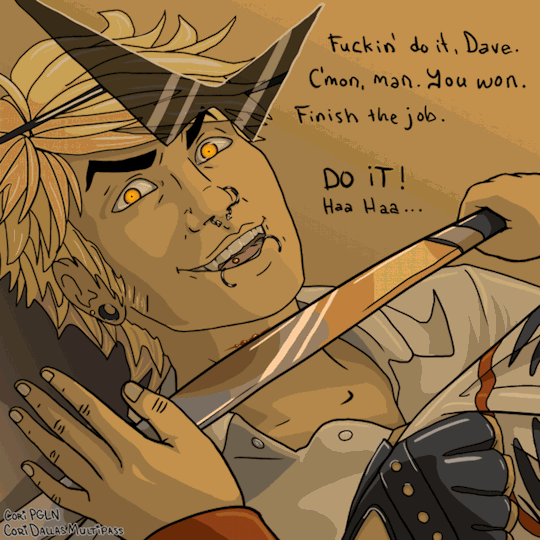
TG: bro flew off the handle
TG: theres seriously something weird going on with him
TT: So you finally noticed.
TG: no i mean it
TG: just beat him in a strife for the first time
TG: he fucking lost it
TT: That would imply he ever had it to begin with.
TG: if you saw what i saw
TG: ugh i dont even know
TG: forget it
So listen, everyone loves a Decap Dirk, that's my main excuse. I thought about what if Bro tries to get Dave to finish him off early. IDK. It was a shitpost kind of idea, but I just kept making the drawing a more finished quality, and so I had to commit to finishing it.
Bro and Dave are trans men.
Still HQ versions and image text under the cut:
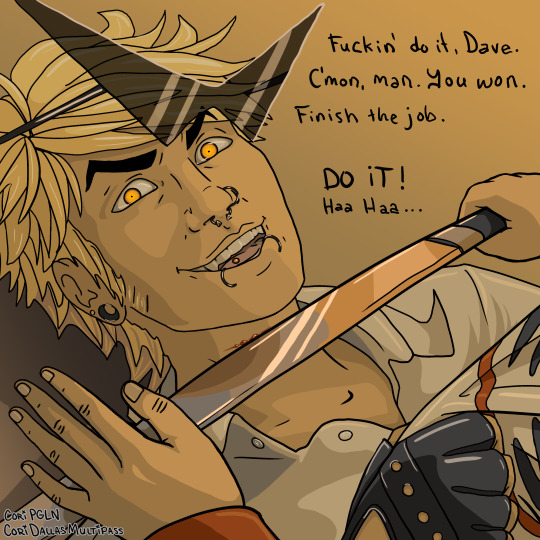
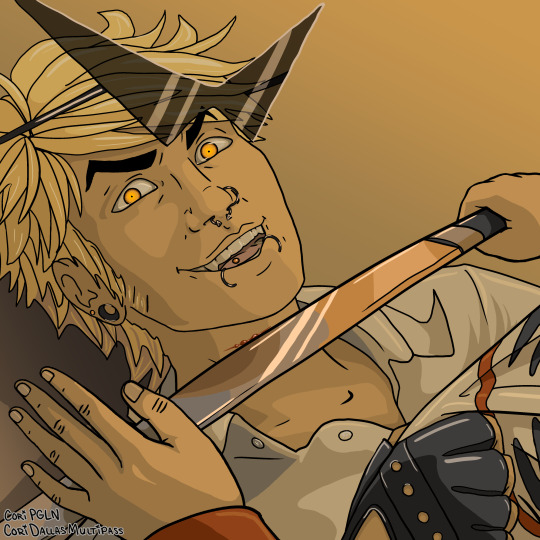
Image text:
Fuckin' do it, Dave.
C'mon, man. You won.
Finish the job.
DO IT!
Haa Haa...
[Image is from Dave's point-of-view. Bro's neck is pinned under Dave's sword, his sunglasses are askew and he has a wild grin and facial piercings. Bro holds Dave in place by grabbing his shirt. Bro's eyes are wide, and his left one shows a flash of billiard ball patterns before returning to normal.]
#homestuck#bro#bro strider#dave#dave strider#trans bro#trans bro strider#trans dave#trans dave strider#striders#homestuck fan art#fan art#art#drawing#digital art#what do i tag this#blood#the gif killed the quality i fought so hard for lmao some weird glitch was happening while i drew where i kept seeing pixels#(i have proof of that happening too bc the eyedropper was able to see the diff lol it was weird)#but yeah theres my drawing that took me ages to finish ugh the colour choices were so difficult to do#i had to do all the shading on the same layer because of the lighting being weird which was a whole challenge#i love how it looks i just wish it wasnt such a weird idea#Cori.exe#Image.exe#Create.exe#gif warning
67 notes
·
View notes
Text
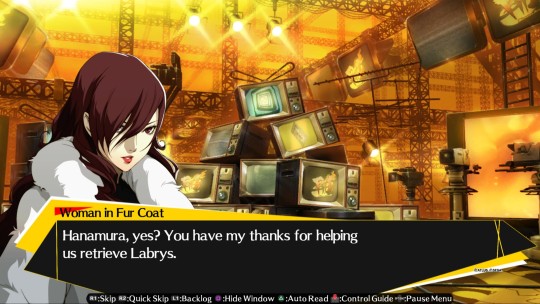
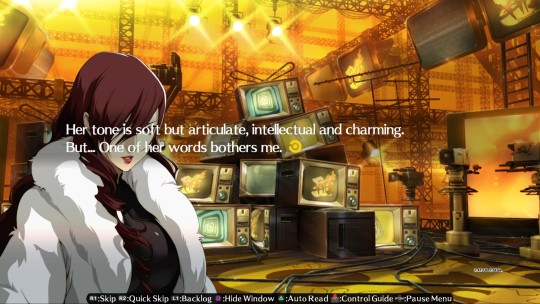

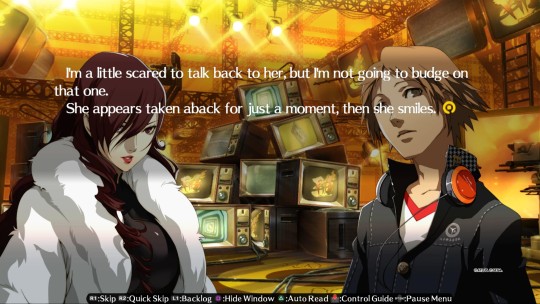
#persona 4#p4#persona 4 arena ultimax#p4au#hanamura yosuke#yosuke hanamura#mitsuru kirijo#no but fr i ADORE this scene i love yosukes unflinching courage for standing up for others#mitsuru is KNOWN to be intimidating even at first glance and in this instance yosuke has only just met her#and even then hes immediately jumping to protect labrys because protecting others is such a fundamental core of what he believes in#i also love that the point that bothers yosuke is mitsuru's word choice#he doesnt have any evidence or proof about the kirijo group or even that much of an awareness of them beyond the everyday#but his deep empathy means he noticed that mitsuru's use of the word “retrieval” speaks to their perception of labrys#so even without any context#yosuke is sensitive enough to notice these details that is otherwise quite easy to miss#anyway yosuke's empathy and sensitivity is something that ive probably talked about too kuch already and this is just another example!!!#he's good with his queue
224 notes
·
View notes
Text
When byler is canon, but it's 2025 and there’s already been like 100+ gay romances in mainstream media for the last ten years and it's not even close to being groundbreaking anymore and so the Duffers have to pull out the receipts like Nooo you don't get! It was a slow burn gay romance! Look at this scene from s2 of Steve with a rainbow bandaid on calling Mike Nancy !!!!
#byler#everyones gonna be saying it was random and came out of nowhere#and the duffers are gonna be fighting for their lives#they're gonna have no choice but to admit the proofs out there to get people off their backs#it's gonna be hilarious
145 notes
·
View notes
Text
currently dwelling on the fact that (before watching the episode) i couldn’t have identified this person
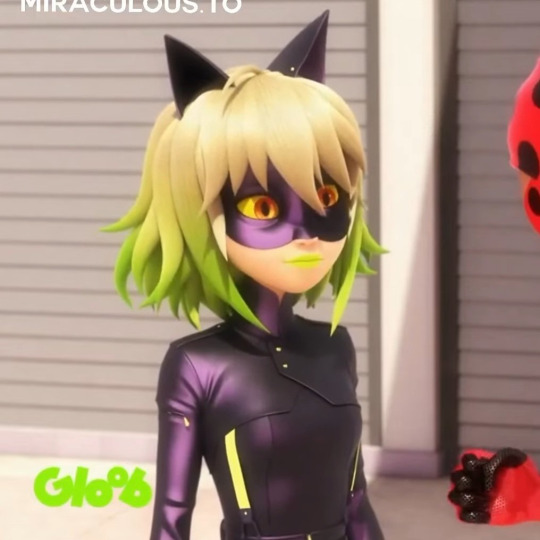
and that means that i’m JUST AS BLIND AS THE ENTIRETY OF PARIS????
#LIKE WE ALL LAUGH AT LADYNOIR FOR NOT IDENTIFYING THEIR CIVILIAN FRIEND IN THEIR PARTNER#BUT KITTY NOIRE IS PROOF THOSE MASKS WORK#kitty noire#transmission spoilers#5x10 spoilers#kwami’s choice spoilers#ml s5 spoilers#ml#miraculous ladybug#mine
886 notes
·
View notes
Text
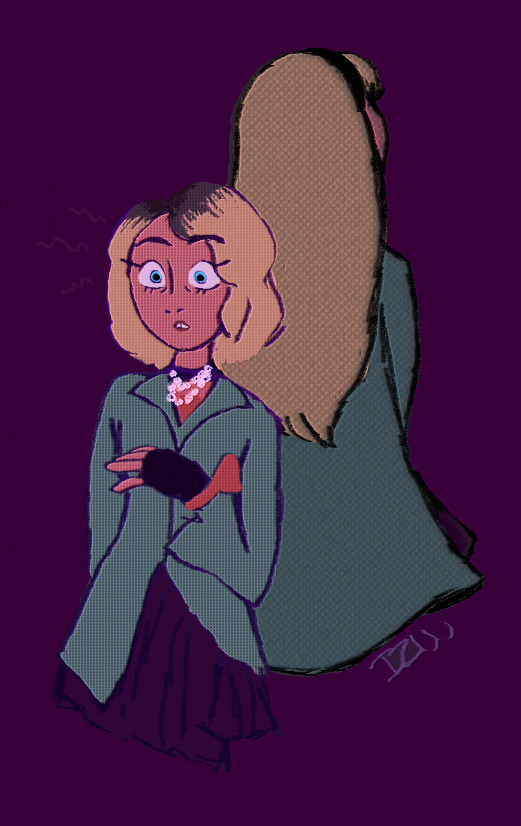
One night on Earth-65, as Gwen Stacy tries on outfits for prom, she sees that one of them looks a little...familiar.
Inspiration below the cut:
The concept art for Gwen's prom outfit (by @chuwenjie!) and her comic outfit (which is also in The Night Gwen Stacy Died)
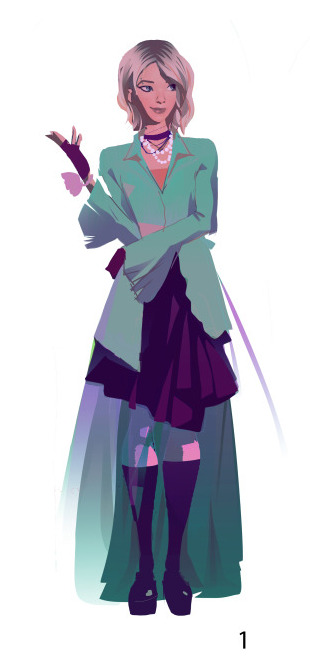

and a doodle
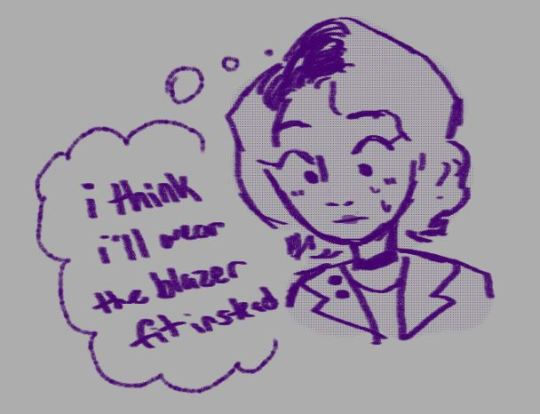
#gwen stacy#across the spiderverse#spider verse#spider-man#atsv#spiderverse fanart#atsv fanart#my art#artzeeart#artists on tumblr#green jacket purple skirt and boots. all that's missing is the black shirt#this may be a reach and the design choice may or may not be intentional but IDC#I see the slightest parallel and I go nuts#also more proof that I can draw humans haha
102 notes
·
View notes
Text
I don't really know how to feel about the fact that Ahsoka has all these things that could help revive the Order, and she just doesn't share it with Luke who is actively trying to revive the Jedi Order. Like, Hyuang is with her as she goes on an intergalactic space trip, and she has holos of Anakin training lightsaber combat, which I would argue she doesn't really need.
And, idk, I wouldn't say it's selfish for her to have these things, that's not really fair on her, and I don't expect her to give them to Luke, but I do hope she shares that knowledge with him.
#i really hope she shares it with him#i dont expect her to give them to luke because hyuang can obviously make his own choices and the holos hold sentimental value#but i just really want luke to have something good of his father with him#some tangible proof that (aside from saving Luke) anakin was agood person#also why doesnt anakin visit luke on his adventures?#you're telling me Vader spent years chasing his son just to be absent when he dies?#anakin “son boy need son boy” skywalker haunts luke and delights himself in their adventures#ahsoka critical#this is isnt really abiut her as a character but rather just how strange it is to have a force centric show in the age of the new republic#and have luke skywalker missing#luke skywalker#star wars#pro jedi
137 notes
·
View notes
Text
TTPD at it's core is about the slow, miserable death of a life you've imagined with a man you desperately wanted to be the love of your life and then the rush of a toxic situationship with a man more in love with wasting your time and the idea of you than he is WITH you, while you project your hopes and fears onto him because you're terrified no one will ever truly love you.
#and if this is proof of your ship RIP I guess#like even the love songs are RIFE with one sided feeling and insecurity#before she tells us he GHOSTED her without a word and left her MISERABLE during what should have been the best summer of her life#I'm not gon a fandom police but it's a really weird hill to die on because what about any of ttpd is end game?#and if it is ship coded that makes Matty Azriel which#is a choice I guess#I'm gonna get hate for this post but like idk pals
25 notes
·
View notes
Text
On the Subject of Susan
I'm going to be a little blunt and my words may seem antagonistic here. But no hate, please. I'm just trying to analyze and provide my analysis based on the very simple facts. Now.
I've never quite understood the anger at C. S. Lewis for how he ended Susan's tale. Mainly, I suppose, because I had the whole story.
Everyone gets angry that Susan is "banned from Narnia" because she likes lipstick and nylon stockings and being a teenage girl in the 1940s, but no one seems to understand that that's not quite how it went, much less that Susan still has a chance.
Let me work backwards a moment and explain the latter. You see, to quote Lewis himself, in a letter to a girl called Marcela in 1955,
"...Haven’t you noticed in the two you have read that she is rather fond of being too grownup? I am sorry to say that side of her got stronger and she forgot about Narnia... ...She is left alive in this world at the end, having been turned into a rather silly, conceited young woman. But there is plenty of time for her to mend, and perhaps she will get to Aslan’s country in the end—in her own way. I think that whatever she had seen in Narnia she could (if she was the sort that wanted to) persuade herself, as she grew up, that it was ‘all nonsense’”
Now, there's a lot to unpack here, but first and foremost, my point is quite simple. "Perhaps she will get to Aslan's country in the end-in her own way." It was always meant to be open ended, for Susan. Narnia is not forever closed to her, unless you and she choose so.
"But Peace!" I can hear you saying, "There's that whole 'too fond of being grownup' phrase!" Why yes, yes there is, how clever of you to notice. The whole point of the latter portion of Susan's arc is that she chose that- lipstick and nylons and "being grownup"- over Narnia. She grew and she chose to forget Narnia.
After all, what sort of modern teenage girl (in England, during WW2) would be so interested in medieval times and what they probably explained to their friends to be a good old game of pretend? No, no, she can't remember Narnia right now - she's going to the cinema with a few girl friends, she's going to a party, she's focusing on everything but there and inevitably, after pushing it away for so long, Narnia let her be.
You see, C. S. Lewis was a very Arminian (and yes, I spelled it correctly) Christian theologian. And while I'm sure most of you here on this hellsite would like to ignore that, it is relevant to how Lewis wrote his fiction. After all, it's at the core of his basic beliefs, despite his being a staunch atheist in college and into his adulthood, and despite what you may like to think, it crept into his writing even when he did not intend it. For example, The Lion, the Witch, and the Wardrobe is called an allegory for the story of the Resurrection, despite Lewis' arguments to the contrary. He insisted that it be seen as what it is, very heavy symbolism. Very heavily used Christian symbolism, that is all over the Chronicles whether you like it or not.
Let me explain why this is relevant to Susan, what Arminianism even is, and how that term applies here. Susan is, so to speak, a symbol of an atheist left behind, after all of the Christians she called family died. In a situation where you regard Christianity as true, she is left on Earth while they have gone on to heaven. And this doesn't mean that the gates of heaven are closed to her, quite to the contrary! They would be closed on the day she died insisting that Jesus Christ was not Lord, plain and simple. She has a choice to make, so long as she is alive.
Now, to Calvinist theologians and Christians, Susan never had a choice. Either Aslan, the God symbol here, chose to bring her in, or he didn't. Calvinists believe in a thing called predestination, the concept that every believer that would ever be brought to heaven is chosen specifically by God. Arminianism declares the opposite. It's a whole thing in Christian theological circles, but that's irrelevant to this discussion. In any case, the core of Arminianism is that you and I have a choice in whether or not we believe in God, and in whether or not we go to heaven.
To an Arminian theologian, God, or Aslan in this symbolic case, can influence our choice, Susan's choice, up to a point. Once we reach that point, once Susan forgets, God, or Aslan, steps back. He accepts our choice, allows Susan to forget. It's up to us, up to Susan after that.
Lewis was an Arminian theologian. He made the point, repeatedly, in his theological works, about people having a choice.
He repeats that point with Susan.
One last thing, before you go. You see, there was another letter about Susan, after The Last Battle was released. He'd been asked if he ever intended to finish Susan's story.
This was his answer.
“I could not write that story myself. Not that I have no hope of Susan’s ever getting to Aslan’s country; but because I have a feeling that the story of her journey would be longer and more like a grown-up novel than I wanted to write. But I may be mistaken. Why not try it yourself?”
Well, my people? Now that you've heard what I had to say (and say through quite the essay, my apologies), why not? Go, do what you do and tell her story for yourself. The author has encouraged fanfiction, so go on! And don't worry about Christianity and symbolism too much. It may help you understand how and why Lewis wrote what he did, but unless you're determined to have your tale in his style and overlapping seamlessly with canon, it's unnecessary. Unless you choose to make it a part of your life, you don't have to be concerned about it.
Feel free to ask questions, and I'll answer to the best of my ability, with Google by my side!
Also, I nearly forgot. There are absolutely other problems with Susan being the last of her family, left alone in the aftermath of WW2. This is not the place to talk about those, however, merely to help you understand why she "is no longer a friend of Narnia" and to remind you that there's always hope.
Oh, and besides that, don't forget that I'm talking about the books and not the movies thank you very much, while The Lion, the Witch, and the Wardrobe was absolutely perfect to canon the other two were not and I'm not going to consider them in this post. I do appreciate them, but when dealing with book canon they're both nos.
#susan pevensie#the chronicles of narnia#the problem of susan#narnia#narnia susan#well this wasn't my plan for 3 am but here we are#arminianism#calvinism#my theology is very arminian leaning#but i tried to depict the two sides fairly#or as fairly as i can at 2 in the morning#if you want to know#im arminian with a touch of predestination#i believe that you get a choice#but also that sometimes#like with paul#god will smack you upside the face with undeniable proof of his existence#even then denial is an option#just not denial of his existence anymore more denial of his sovereignty
56 notes
·
View notes